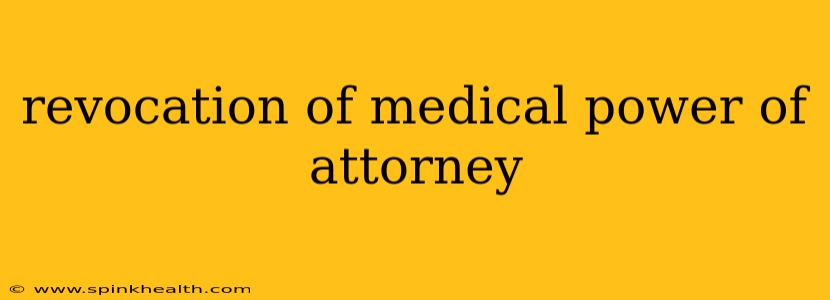The crisp autumn air swirled fallen leaves outside my window as I sat down to tackle the daunting task of updating my medical power of attorney. It wasn't a pleasant thought, but ensuring my wishes were respected regarding my healthcare in the event of incapacity felt crucial. This experience sparked a deep dive into the process, specifically the often-overlooked aspect: revocation. This isn't just a legal formality; it's about maintaining control over your own life and healthcare choices.
This guide will navigate you through the complexities of revoking a medical power of attorney (MPOA), addressing common questions and concerns. Understanding this process empowers you to make informed decisions about your healthcare future.
What is a Medical Power of Attorney (MPOA)?
Before we dive into revocation, let's clarify what an MPOA is. An MPOA is a legal document that allows you to appoint someone you trust (your agent or healthcare proxy) to make healthcare decisions on your behalf if you become unable to do so yourself. This incapacity could stem from illness, injury, or cognitive impairment. Your agent will act according to your wishes, as expressed in the document or verbally, if possible.
How Do I Revoke My Medical Power of Attorney?
This is the crucial question, and the answer depends on the specifics of your state's laws and the wording of your MPOA. There's no single, universal process. However, most states require a written revocation statement. This statement should:
- Clearly state your intention to revoke the MPOA. Don't leave any room for ambiguity.
- Identify the specific MPOA you are revoking. Include the date it was signed and the names of all involved parties.
- Be signed and dated by you. This is essential to validate the document's legality.
- Ideally, be witnessed and notarized. While not always legally required, this adds an extra layer of security and proof.
- Be delivered to the appropriate parties. This usually includes your agent, your healthcare providers, and potentially your attorney.
What Happens After I Revoke My MPOA?
Once you've executed the revocation, it immediately becomes effective. Your previously appointed agent loses their authority to make healthcare decisions on your behalf. It's vital to inform your healthcare providers of the revocation to prevent any confusion or unintended consequences.
Can I Revoke My MPOA If My Agent is Unresponsive?
This situation is complex and depends greatly on the specifics of your MPOA and state law. If your agent is unresponsive, but hasn't acted against your wishes, it may not be necessary to formally revoke the document. However, if you believe your agent is not acting in your best interest or is making decisions contrary to your wishes, a revocation is necessary and you should seek legal counsel.
What if I Don't Remember Signing a Medical Power of Attorney?
If you're unsure if you've signed an MPOA, it's crucial to check your personal records. You can contact your attorney, review your safe deposit box, or reach out to any family members who might have knowledge of this. If you discover you have an MPOA you no longer want, follow the revocation steps above.
What Happens if I Die Before Revoking My MPOA?
If you pass away before revoking your MPOA, the document remains valid. Your designated agent can still act on your behalf in making end-of-life decisions regarding your healthcare.
Do I Need a Lawyer to Revoke My Medical Power of Attorney?
While not always mandatory, seeking legal counsel is often recommended, especially if your situation is complex or you have concerns about the revocation process. An attorney can ensure the revocation is legally sound and complies with your state's requirements. They can also help you create a new MPOA if you wish to appoint a different agent.
Navigating the revocation of a medical power of attorney can seem daunting, but with careful planning and understanding of the process, you can retain control over your healthcare decisions even if you become incapacitated. Remember, proactive planning provides peace of mind. It's a gift of self-determination you can offer yourself and your loved ones.

